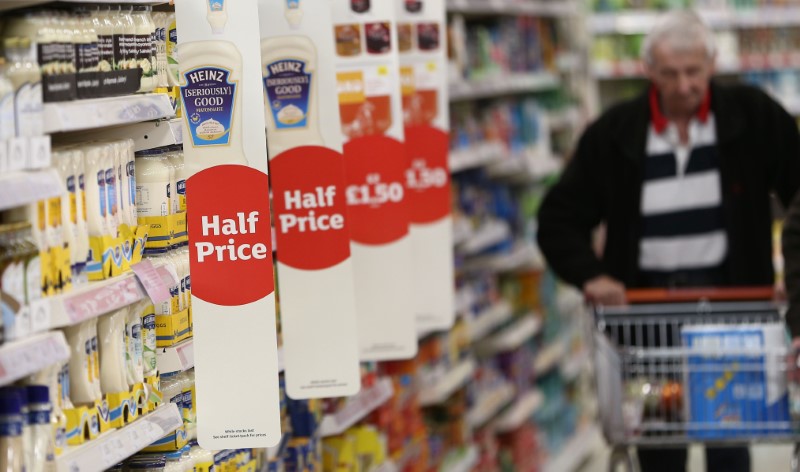By David Milliken and William Schomberg
LONDON (Reuters) - British retail sales unexpectedly surged in August, official figures showed on Wednesday, boosting the chance the Bank of England will raise interest rates at its next meeting.
The data came, however, as a BoE survey showed businesses generally reporting slowing demand across a number of consumer-facing sectors as well as subdued labor cost growth.
Last week the BoE surprised investors by saying it was likely to raise rates in the coming months if the economy and inflation pressures strengthen as expected, despite the uncertainty about Britain's withdrawal from the European Union.
Wednesday's official data showed a sharp pick-up in monthly sales growth in August to its fastest since April, despite inflation pressures that have previously squeezed spending.
Retail sales volumes rose 1.0 percent month-on-month, double the highest forecast in a Reuters poll of economists, and July's sales growth was revised up to 0.6 percent.
Sterling jumped by more than half a cent against the U.S. dollar
"Consumers are showing an impressive resilience in the face of the ongoing real pay squeeze," said Ruth Gregory of Capital Economics. "As a result, a modest pick-up in household spending should help the economy to re-accelerate a little ... and adds weight to our view that the Monetary Policy Committee will hike interest rates in November."
Looking at the three months to August as a whole, which smoothes out monthly volatility, sales growth rose to 1.2 percent from a three-monthly rate of 0.7 percent in July.
However, the ONS said near-record sales growth would be needed in September to stop third-quarter growth slowing from the three months to June.
BoE policymakers expect moderate third-quarter retail sales growth as consumer demand shows signs of improving after weakness earlier in the year, though they said it was too soon to tell if it would compensate for weak business investment.
Compared with a year earlier, sales in August were up 2.4 percent versus expectations of a 1.1 percent rise.
"Within this month's retail sales we are seeing strong price increases.... However, we are still seeing underlying growth in sales volumes, and with strong growth in non-essential purchases," ONS statistician Kate Davies said.
INFLATION SQUEEZE PEAKING?
Rising inflation has eaten into British consumers' disposable income this year, causing the weakest first quarter for retail sales since 2010, as the fall in the pound after last year's Brexit vote pushed up the cost of the imports.
The BoE survey on Wednesday that showed businesses reporting slowing demand also suggested that the effect for the post-Brexit vote weaker pound appeared to be at its peak.
Last week the BoE said it expected consumer price inflation to peak at just over 3 percent in October, compared with 2.9 percent now, and then fall slowly.
The narrower measure of inflation used in retail sales data rose to an annual rate of 3.2 percent in August, up from 2.7 percent. Looking just at goods sold in non-food stores, inflation was its highest since March 1992.
Official data last week showed wages in the three months to July were 0.4 percent lower in real terms than in 2016, and a survey of households by financial data company Markit reported the biggest squeeze in three years.
Private-sector figures had given a mixed message on retail spending in August. The Confederation of British Industry reported the weakest performance since July 2016, while the British Retail Consortium said top-line growth was the fastest so far this year.

Kingfisher (L:KGF), Britain's biggest home improvements retailer, said earlier on Wednesday that purchases of expensive items such as power tools and new kitchens had not changed, though it was cautious about the outlook.